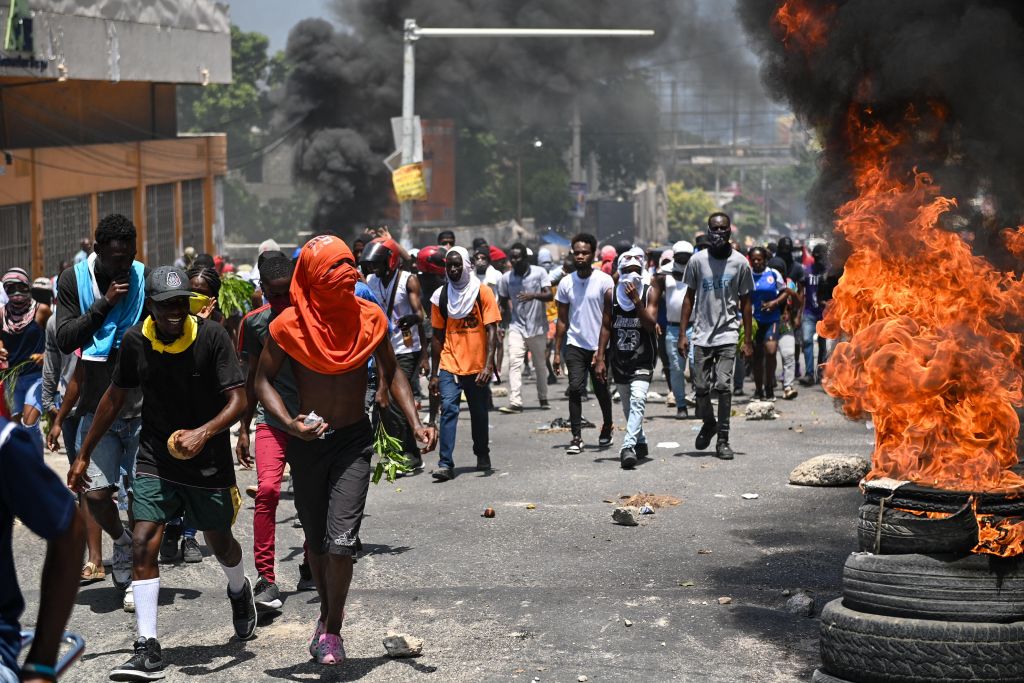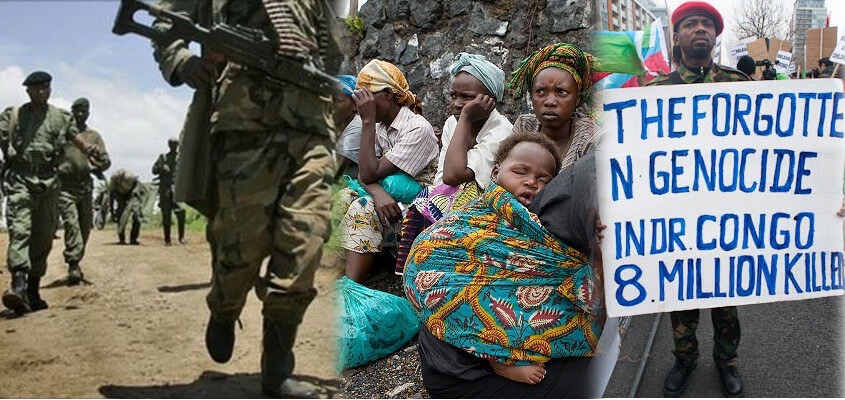Gaza Is DR Congo, Gaza Is Haiti
TRANSCEND MEMBERS, 26 Feb 2024
Marilyn Langlois – TRANSCEND Media Service
24 Feb 2024 – How can I hold the knowledge of unspeakable horrors happening far away and not explode inside?
How can I sit in my modest but comfortable home, refrigerator well stocked, knowing what unbearable suffering is being inflicted on my brothers and sisters in the human family and not run raging through the streets screaming Stop! Stop!?
How can I hold the knowledge of my own so-called government, via named and nameless maleficent megalomaniacs, facilitating unspeakable horrors far away and not take the first flight to my nation’s capital and hurl buckets of blood at the White House?
All eyes are on Gaza right now, as well they should be, calling for an immediate halt to Israel’s genocidal assault that is enabled by an uninterrupted supply of US weapons. That deplorable situation has thankfully been widely covered across the media spectrum and has garnered enormous outpourings of outrage and support for Palestinians in massive demonstrations in cities all over the world.
What’s happening in Gaza has also been happening in the Democratic Republic of Congo and in Haiti with severe abuses intensifying after decades of US-backed repression, though honest coverage of either, even in alternative media, is rare.
Last week independent journalist Ann Garrison published the transcript of her interview with a journalist in eastern DRCongo about the escalating, vicious rampages throughout this resource-rich region by M23 militias from Rwanda, a de facto Western protectorate with ample US backing. The number of destitute internally displace persons living in ill-supplied camps around Goma has reached 3 million. Rwanda has remained largely above criticism in the West for the last 30 years thanks to propaganda that has exonerated the ringleaders of the 1994 genocide and even placed them at the helm of leadership.

People march as tires burn during a protest against insecurity on 7 Aug 2023 near the Prime Minister Ariel Henry’s official house in Port-au-Prince, Haiti.
Richard Pierrin / AFP via Getty Images
A Congolese friend of many years who has been working with villagers eastern DRCongo to promote peaceful relations and build local self-sustaining enterprises wrote to me a few days ago as follows (names redacted for their safety):
Dear Marilyn,
I hope this message finds you well amidst these challenging times. I am writing to you with a heavy heart and a sense of urgency that I find difficult to express in words. The situation we are facing here, as I briefly mentioned before, has escalated beyond our worst fears, plunging our community into a dire state of despair and hopelessness.
The recent article by Ann Garrison, which you shared, barely scratches the surface of the catastrophic conditions people are enduring. I live and I am directly affected by this situation. That is the reason I had to move from Goma, Rugari to Uganda. My own experiences and the unbearable reality of our lives here underline the severity of the crisis. The everyday threats and some direct attempts to my physical being was just unbearable. I am sorry that I did not want to alarm you with this situation earlier
The conflict has forced the whole community to flee their homes in Rugari, seeking refuge around Goma displaced camps. The threats to our lives were not just imminent; they are a clear and present danger, leaving them with no choice but to leave everything behind in search of a semblant of safety. The population in general are revolted, and many civilians are volunteering for the frontline to help the regular army. A lot of massacres have been taking place in the occupy territories.
The displacement has shattered our community, scattering them across various camps around Goma. Rugari, now lies deserted, occupied by M23/Rwanda Special Forces and mercenaries. Our efforts to rebuild and provide for our people have come to a standstill. The last of our funding and the one you sent last time, was consumed by immediate needs for the displaced: medicine, shelter and food, resources that have now been exhausted.
The arrival of XX and the children next week adds to the urgency, as I find myself completely with no budget or devoid of resources and solutions. The despair among us is palpable, and I confess, I share in this hopelessness. Our situation seems insurmountable, and I am at a loss for what to do next.
This week Haiti is commemorating a dark day in its history, the February 29, 2004 US-backed coup d’état that ousted wildly popular and democratically elected President Jean-Bertrand Aristide and plunged the country into political repression that persists to this day. I traveled to Haiti 4 times between 2004 and 2016 to bear witness to both abuses of the illegitimate regime and the heroic efforts of Haitian people to resist, survive and take care of each other in spite of appalling conditions.
In the past two years, however, a Haitian teacher who has hosted us in the past is living in hiding and has discouraged us from coming to Haiti at this time due to increasing kidnappings, killings and burning of neighborhoods by “gangs” and paramilitaries who are covertly backed by the regime and receive container loads of guns from south Florida, as documented by the UN Office of Drugs and Crime. Primary targets are known activists of the Lavalas movement, encompassing the bulk of the desperately poor majority, but no one is really safe. A recent report by the UN Office for the Coordination of Humanitarian Affairs documents over 313,000 internally displaced persons in tiny Haiti, along with growing food insecurity. A Haitian friend has told me her family and others often go multiple days without eating.
While the US and many UN Security Council members recommend deploying a multinational military force led by Kenya to address the escalating violence in Haiti, such a move is strongly opposed by masses of the population who have been brutalized by foreign soldiers in their country in the past. Instead, they call for measures from abroad to halt the flow of illicit firearms from the US into Haiti, while local communities form networks of self-defense. Ultimately the people insist on creating space to determine their own government and control their natural resources.
There is a common theme at play in Palestine, DRCongo and Haiti. Brazen leaders and shadowy elites are using the military, financial and political muscle of the US to provide weapons and diplomatic cover to those who carry out the killings, displacements, withholding of food and destruction of communities to achieve their ultimate goal of conquering the land and resources while subduing, demoralizing and ultimately eliminating the indigenous population–or in Haiti’s case, since previous colonizers already eliminated the indigenous population 500 years ago, the descendants of kidnapped and enslaved Africans who replaced them.
Bottom line, those who would be gods and hold dominion over others want the land but not the people who have lived there for centuries. But many people aren’t putting up with it. Resistance is happening in all three locations by the beleaguered inhabitants themselves, and those resisting must be acknowledged and supported.
As someone who was born, raised and lives on a whole continent of stolen land conquered generations ago via genocide and ethnic cleansing, I feel horrified yet helpless watching these same crimes against humanity being committed today with my tax dollars. While I can protest in the streets, send letters to elected officials, write articles, sign petitions, join solidarity groups and donate to relief funds, it seems that none of this is making a real difference. But I know that if I do or say nothing, then I am complicit.
____________________________________________
 Marilyn Langlois is a member of TRANSCEND USA West Coast. She is a volunteer community organizer and international solidarity activist based in Richmond, California. A co-founder of the Richmond Progressive Alliance, member of Haiti Action Committee and Board member of the International Center for 9/11 Justice, she is retired from previous employment as a teacher, secretary, administrator, mediator and community advocate.
Marilyn Langlois is a member of TRANSCEND USA West Coast. She is a volunteer community organizer and international solidarity activist based in Richmond, California. A co-founder of the Richmond Progressive Alliance, member of Haiti Action Committee and Board member of the International Center for 9/11 Justice, she is retired from previous employment as a teacher, secretary, administrator, mediator and community advocate.
Tags: D.R. Congo, Gaza, Haiti, Massacre, Warfare
This article originally appeared on Transcend Media Service (TMS) on 26 Feb 2024.
Anticopyright: Editorials and articles originated on TMS may be freely reprinted, disseminated, translated and used as background material, provided an acknowledgement and link to the source, TMS: Gaza Is DR Congo, Gaza Is Haiti, is included. Thank you.
If you enjoyed this article, please donate to TMS to join the growing list of TMS Supporters.

This work is licensed under a CC BY-NC 4.0 License.

Thanks for your poignant article and bringing attention to Congo and Haiti. It is good how much attention Gaza is getting but bad how little others are. I am also acutely aware of my safety. Even having been displaced for 2 months before moving into my nontoxic, safe apartment, I try to imagine traumatized Gazans suffering for basic needs under constant threat and surrounded by death. I hope all of our efforts eventually lead to something.